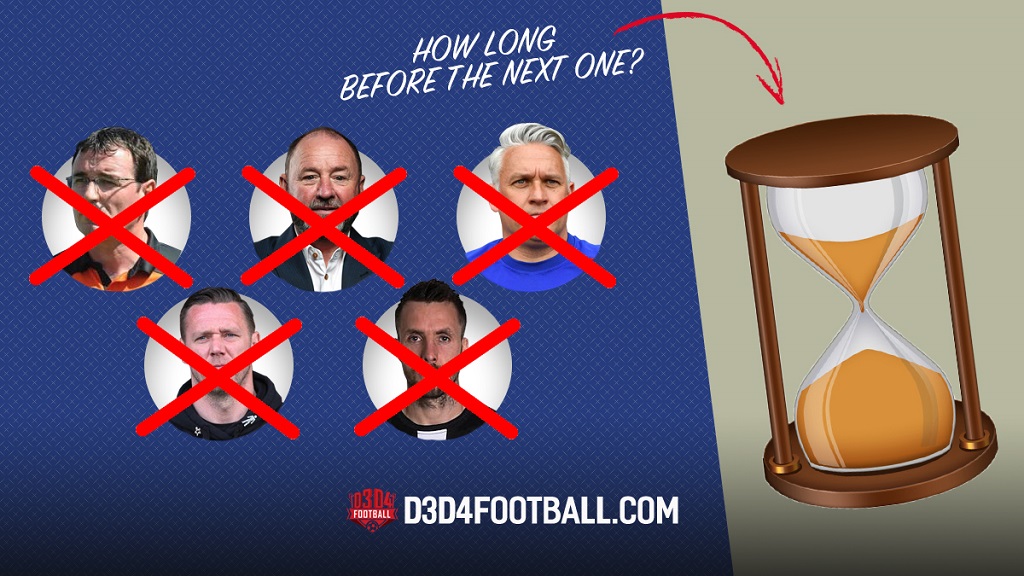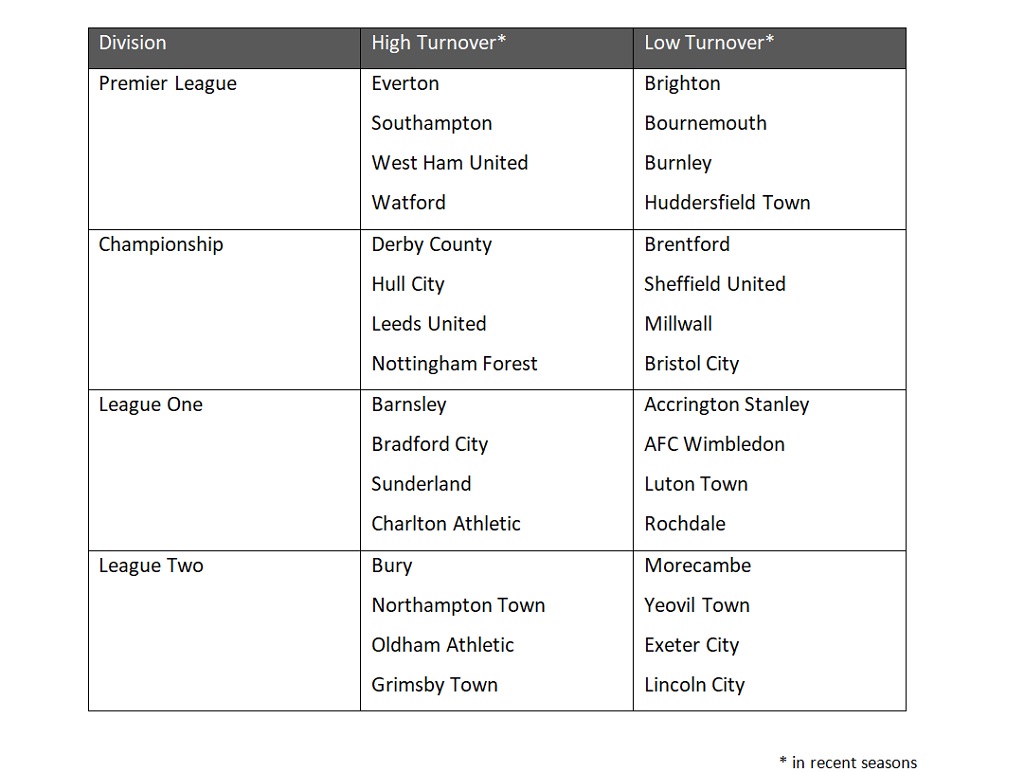 This week D3D4 columnist Darren Young gets his teeth stuck into the issue everyone’s been talking about…Should managers be given more time?
This week D3D4 columnist Darren Young gets his teeth stuck into the issue everyone’s been talking about…Should managers be given more time?
Read on to find out more:
‘You’re Getting Sacked In The Next Five Minutes’
Tomorrow morning is simply too long to wait these days.
Last week, I had a not-altogether-serious swipe at clubs that get rid of their manager in the first month of the season. This week, I’m being more serious on the matter. After yesterday’s decision at Bradford, EFL Leagues One and Two are already seeing casualties at an alarming rate.
1.Gary Bowyer – Blackpool (1 match)
2.Gary Johnson – Cheltenham (4 matches)
3.Nick Daws – Scunthorpe United (4 matches)
4.Kevin Nolan – Notts County (5 matches)
5.Michael Collins – Bradford City (6 matches)

That’s more than 10%. It’s quite conceivable that more than 60% of clubs won’t finish the season with the manager who started it. The numbers above are in addition to several departures in Scotland and the National League already, and we are only one game into September.
The top two divisions in England are, for now at last, not following suit but as MoPo found out at the weekend, even a 100% winning start to a season doesn’t protect you from suggestions that you don’t know what you’re doing when you lose it. Maybe in the higher divisions, compensation is a factor. Jose Mourinho has said that it would cost a fortune for Manchester United to sack him, according to La Repubblica, whilst a similar deterrent might persuade West Ham United to give Manual Pellegrini more time even though he’s done a ‘Ronald De Boer’ and we all know how that one worked out.
Of course, it worked out well for Crystal Palace, who replaced De Boer with a dependable and point-to-prove, Roy Hodgson, who guided a then-pointless team to PL survival and a respectable points tally. It’s the reason clubs will keep doing what they do; there is always a chance the next guy will get it right.
There is also a chance they won’t. It’s footballs version of Russian Roulette.
It’s not necessarily the sacking (or parting of ways, as they like to dress it) that bothers me. I don’t like to see anyone lose their job but it’s a handsomely rewarded job and they know what they are getting into from the outset. The LMA have also worked tirelessly to make sure that managers who do find themselves out of work are paid what they are due. What I’m questioning is the actual constant chopping and changing of managers, especially during the season and even more so, after just a handful of matches.
Does it really work? Watford seem to have found a formula for success in spite of managerial instability yet this season, having kept their manager from last time around and not introduced a new one for pre-season, they now sit joint top with Liverpool with a four-game winning start. So, you could say that their management ins and outs were actually holding them back in previous years. We’ll never know.
And who is ruling out a slump from November anyway that will see a new head coach appointed by the end of the January transfer window?
I haven’t crunched all the numbers but do clubs who pull the trigger quickly ever find what they are looking for? And even if they do in the immediate period, or that season, what is the longer-term impact on the club?
I look at clubs with a high turnover of bosses and wonder how many are closer to achieving their objectives now than they were, say, five years ago. Or even longer. The stop-start nature is surely putting the handbrake on progress. In many cases, how can it not? They are pressing the reset button time and again, and the reset button only usually gets you back to where you started. Here are other drawbacks as far as I’m concerned….
No Long Term View
It, by its very definition, takes time and no-one has that these days in football. Whether it’s the owners or the fans that can’t wait, there is a clamour for instant gratification and in a league like the EFL, where only ten clubs can get that each season, there are a lot of disappointed owners and fans. But a squad takes time to build and develop a successful squad and how will they ever know if it would have got there?
Bradford City 🎡🤡🎪
Have a manager the fans love & who loves the club 👍
Stay in top 6 entire time
Have a bad run
SACK HIM
Take an age to appoint new manager
Appoint a complete rookie
Sign loads of new players
Don't start well
SACK HIM
Owner doing a gr8 job 🙄#bcafc
— D3D4Football (@d3d4football) September 3, 2018
Squad Turnover
Managers don’t always help themselves. To introduce a dozen or more new players at the start of a season is an incredibly risky way to go about things. Not only does it cost a lot, but the chance of it going wrong are far higher. The old adage about wanting to work with ‘your own players’ is a fair one, but it means that a virtual whole team is having to connect and gel in effectively, a few pre-season games. It’s a vicious circle because if managers are continually fired, then new managers will keep doing this, rather than working with the previous incumbent’s players to improve them, and the problem just never goes away.
The Right Stuff
The people making the decisions at the top must – but often don’t – shoulder a huge portion of the responsibility when it goes wrong. They have, more often than not, appointed the guy to begin with and backed them with signings etc. To then, after a few defeats, say that you no longer back them is, in my opinion, too easy a way out. Of course, no owner will then say ‘I did a terrible job by getting the wrong man, so I’m sacking myself too’ thus ensuring they are still there to do it all again at some point in the future.
Nobody Likes Change
Often a club try something new and a bit different, such as appointing a really young coach or someone with less first team experience or a different background. That in itself is a brave step that needs to be given space and time. But if course, it won’t be, so when the ‘experiment’ doesn’t work immediately, the new approach is abandoned in favour of a revert-to-type appointment of someone very similar to what didn’t work two appointments ago. That’s another thing that always surprises me; the clubs that turn to the tried and tested manager who failed somewhere else for their next appointment, then wonder why he does the same with them.
Media Pressure
Having radio shows ask their bookmaker sponsors who is the favourite for ‘the sack race’ suggests that managers are on a hiding to nothing from day one. Speculation on talk shows, in newspapers and all over social media intensifies the pressure that usually, only a five-game winning run can prevent. The trouble is, even that is a short term sticking plaster these days because once the manager loses the fans, it will take something of extraordinary proportions to turn that ship.
Time and Place
One factor that I think is overlooked is the random pieces falling into place. What works at one club for a manager might not work elsewhere – or anywhere else! Managers don’t change that much as far as I can tell, but every now and again there might just be a perfect fit between man and club and everything else just clicks. This is a warning for managers as much as it is for the owners; a ‘bigger’ club might come calling for their services and they’ll always back themselves to succeed, BUT you don’t know what you’ve got till it’s gone and a supportive, hands-off owner, a patient and forgiving fanbase and hero status might just be priceless.
The Exception That Proves The Rule
Like Roy Hodgson and Watford, there will always be occasions where conventional wisdom goes out of the window and a club gets it right. They will point out – especially in the Premier League with all its money swirling around – that they have to act because if they don’t the consequences could be enormous. But they are called exceptions for a reason.
I’m not suggesting that any club will have a manager that rules the roost for twenty plus years in the way Fergie and Wenger did. It’s unlikely that will ever happen again. But just on the perception of clubs either having a high or low managerial turnover, I’ve listed a few below from each division.

You’ll no doubt disagree with some of these and have clubs you think should be there instead. But the question I ask is, on the whole, have the clubs on the left or right been more successful? Not just in the short term but the last 5-10 years?
Would the ones with low turnover be further forward than they are if they’d pulled the trigger earlier on occasions? And would those with higher turnover be further back then they are now?
I know what I think. But I thought Watford might go down this season so what do I know.
You make up your own mind.


